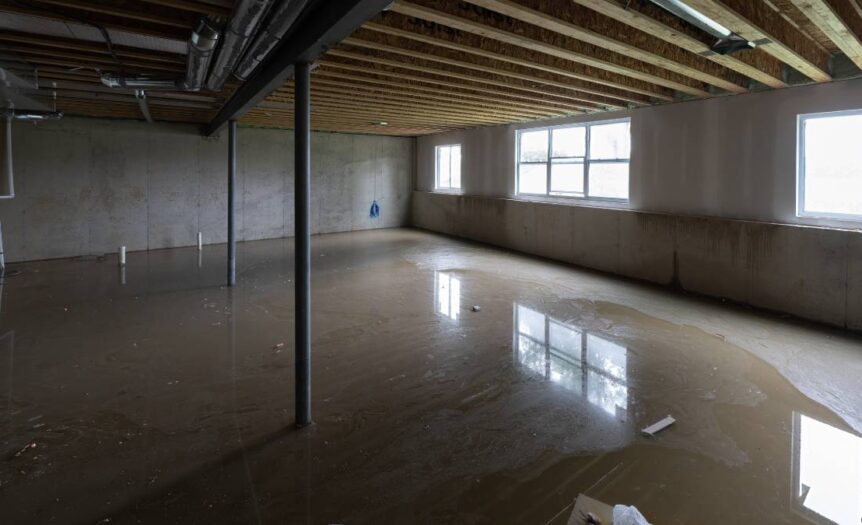Flooding is an increasingly common threat facing homeowners, driven by unpredictable weather patterns and changing climates. Beyond the emotional toll, floods can cause extensive damage to your home, resulting in hefty repair bills and lost personal belongings. Protecting your property from potential flooding is more important now than ever. Below are four effective ways to protect your home from flooding.
Invest in Waterproofing
One of the best ways to protect your home from flooding is by waterproofing it. Start by thoroughly inspecting your foundation for cracks that could allow water to seep in. Even tiny fissures can lead to costly water damage over time. Sealing cracks with high-quality materials prevents this problem before it starts. Beyond that, installing a sump pump is a smart investment, particularly for homes with basements. These pumps play a crucial role in diverting water away from your foundation, keeping lower levels of your home dry even during heavy rainfall. Pair the sump pump with a backup battery system to ensure it operates in the event of a power outage.
Elevate Appliances and Electricals
Floodwater doesn’t just damage your floors and walls—it can permanently ruin appliances and create dangerous electrical hazards. To reduce these risks, elevate essential appliances such as your water heater, washer, dryer, and HVAC systems. Position these on raised platforms or relocate them to higher floors if possible. Additionally, you should move all electrical outlets, switches, and circuit breakers at least a foot above the expected flood level in your area. Doing so protects both the functionality and safety of your home in the event of a flood.
Improve Drainage
Proper drainage is another way to protect your home from flooding. Start by keeping your gutters clean and free from debris, as clogged gutters can lead to water pooling around your foundation. Ensure downspouts are routed at least six feet away from your home to direct water safely away. Another effective way to improve drainage is by grading your landscape to slope away from your house rather than toward it. For added protection, consider installing a French drain system that will efficiently channel excess runoff away from your property.
Install Window Wells
Basement windows are a commonly overlooked weak spot when it comes to flooding. Installing window wells with tightly fitted covers is an easy way to prevent water from seeping into your basement during a storm. Modern window wells have built-in drainage systems that channel water away before it reaches your foundation. Choose clear covers to allow natural light into your basement while keeping water out. Window wells are important because they’re a small upgrade that can save you significant cleanup and repair costs down the line.
Taking proactive measures like waterproofing, elevating appliances, improving drainage, and installing window wells gives you peace of mind when heavy rains hit. By addressing potential vulnerabilities in advance, you can significantly reduce your home’s risk of flood damage and protect what matters most. Start planning and implementing these strategies today to ensure your home is ready for whatever Mother Nature sends your way.










 Deering Estate
Deering Estate
 Massage Envy South Miami
Massage Envy South Miami
 Calla Blow Dry
Calla Blow Dry
 My Derma Clinic
My Derma Clinic
 Sushi Maki
Sushi Maki
 Sports Grill
Sports Grill
 The Healthy Kitchen
The Healthy Kitchen
 Golden Rule Seafood
Golden Rule Seafood
 Malanga Cuban Café
Malanga Cuban Café

 Kathleen Ballard
Kathleen Ballard
 Panter, Panter & Sampedro
Panter, Panter & Sampedro
 Vintage Liquors
Vintage Liquors
 The Dog from Ipanema
The Dog from Ipanema
 Rubinstein Family Chiropractic
Rubinstein Family Chiropractic
 Your Pet’s Best
Your Pet’s Best
 Indigo Republic
Indigo Republic




 ATR Luxury Homes
ATR Luxury Homes


 2112 Design Studio
2112 Design Studio
 Hamilton Fox & Company
Hamilton Fox & Company
 Creative Design Services
Creative Design Services
 Best Pest Professionals
Best Pest Professionals
 HD Tree Services
HD Tree Services
 Trinity Air Conditioning Company
Trinity Air Conditioning Company
 Cisca Construction & Development
Cisca Construction & Development
 Mosquito Joe
Mosquito Joe
 Cutler Bay Solar Solutions
Cutler Bay Solar Solutions


 Miami Royal Ballet & Dance
Miami Royal Ballet & Dance
 Christopher Columbus
Christopher Columbus
 Pineview Preschools
Pineview Preschools
 Westminster
Westminster
 Carrollton
Carrollton
 Lil’ Jungle
Lil’ Jungle
 Frost Science Museum
Frost Science Museum
 Palmer Trinity School
Palmer Trinity School
 South Florida Music
South Florida Music
 Pinecrest Orthodontics
Pinecrest Orthodontics
 Dr. Bob Pediatric Dentist
Dr. Bob Pediatric Dentist
 d.pediatrics
d.pediatrics
 South Miami Women’s Health
South Miami Women’s Health

 The Spot Barbershop
The Spot Barbershop
 My Derma Clinic
My Derma Clinic




 Miami Dance Project
Miami Dance Project

 Rubinstein Family Chiropractic
Rubinstein Family Chiropractic
 Indigo Republic
Indigo Republic

 Safes Universe
Safes Universe
 Vintage Liquors
Vintage Liquors
 Evenings Delight
Evenings Delight





 Atchana’s Homegrown Thai
Atchana’s Homegrown Thai
 Baptist Health South Florida
Baptist Health South Florida

 Laser Eye Center of Miami
Laser Eye Center of Miami
 Visiting Angels
Visiting Angels
 OpusCare of South Florida
OpusCare of South Florida

 Your Pet’s Best
Your Pet’s Best





 HD Tree Services
HD Tree Services
 Hamilton Fox & Company
Hamilton Fox & Company


 Creative Design Services
Creative Design Services